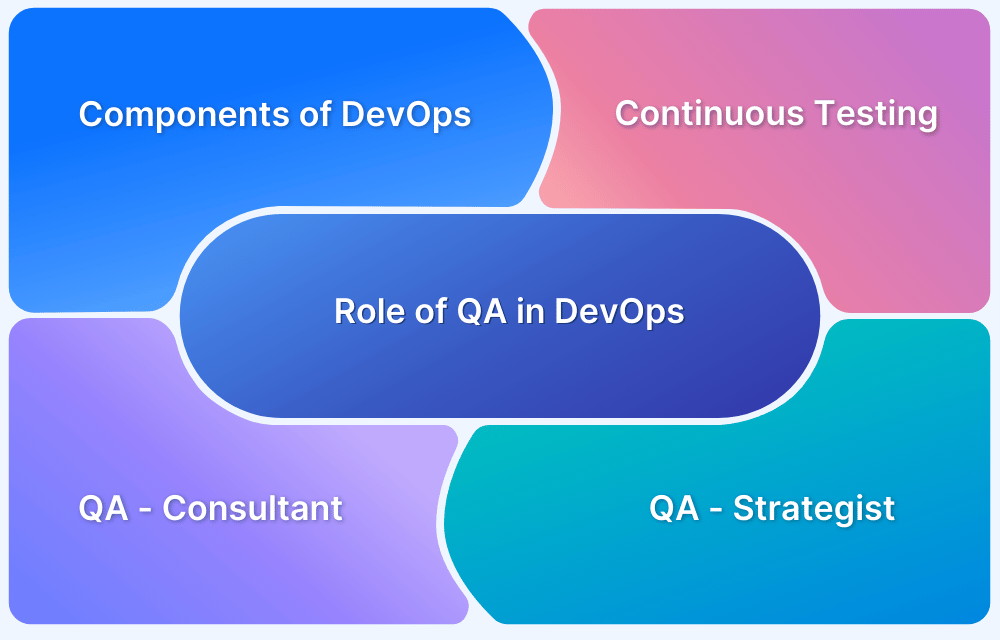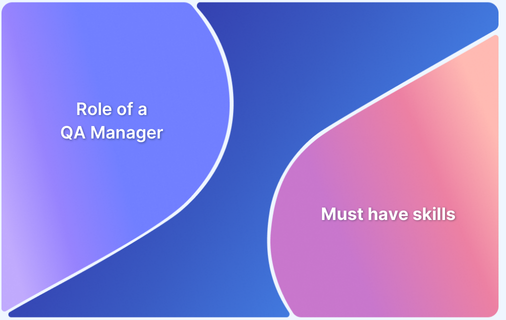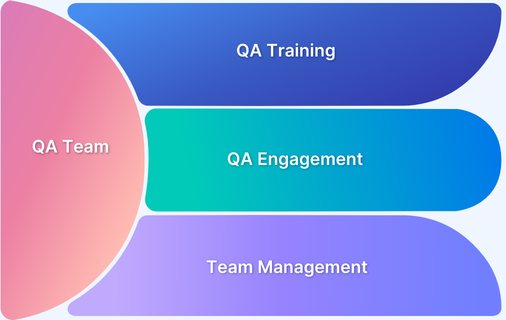Quality Assurance (QA) plays an integral role in delivering reliable, high-performing software. To excel as a QA tester, you need a mix of technical know-how, analytical thinking, and effective communication.
Overview
Technical Skills required to become a QA Tester
- Programming Knowledge
- Agile Testing
- Software Development Life Cycle (SDLC)
- Cross-Browser / Cross-Platform Testing Skills
- Testing Tools & Techniques
- CI/CD knowledge
Soft Skills required to become a QA Tester
- Communication Skills
- Analytical Thinking
- Attention to Detail
- Problem-Solving Skills
- Bug Reproduction Clarity
- Critical Questioning
- Test Storytelling
- Version Empathy
- Rapid Exploratory Instinct
- Ability to Identify Flakiness
- Smart Escalation
- UX Empathy with Data Backing
This article outlines the essential QA skills every aspiring or experienced tester should master to thrive in competitive environments.
Skills required to become a QA Tester
Here are the top skills required to become a QA tester
1. Programming Knowledge
Programming knowledge needed for testers needn’t be as deep as required for a developer. But every tester needs to understand the functionality and create tests according to the language used. This will help testers understand errors in the code and effectively communicate it to developers. They can also effectively communicate workarounds to the developers and help shorten TATs.
2. Agile Testing
Agile Testing follows the methods of agile development methodologies. In the agile testing method, the development is directly correlated to the customer requirements. It starts from the beginning of the project, and there are iterations along the way, from testing to development. Agile development is to have a high product quality.
3. Software Development Life Cycle (SDLC)
For a tester, it is very important to know the entire SDLC cycle. SDLC framework will help testers plan their testing cycles and also learn more about the development tasks. This will help testers evaluate the complexities in the application and take the right measures. Alongside learning the SDLC cycle, testers need to learn methodologies like Scrum, Lean, Kanban and Waterfall – so that they can determine which one fits the best.
Read More: DevOps vs Scrum: Key Differences
4. Cross-Browser / Cross Platform Testing Skills
Testers aren’t siloed to one type of browser. Any new development needs testers to run parallel tests on multiple devices and in various versions of browsers. All the variations should be tested for an error-free operation. Irrespective of what browser, device or version your customer uses, the software should run seamlessly.
Cross Browser compatibility beyond Chrome is needed in this digitally-savvy world now more than ever. Cross-browser testing skills help the testers deliver products without any bugs or errors.
Similarly, for mobile apps, it is important to perform cross platform testing and ensure they are consistent and seamless across different OS-platforms like Web, iOS, and Android.
5. Testing Tools & Techniques
Every tester should be proficient in testing techniques like black-box testing, functional testing, UI testing, regression testing, etc. These methods help the testers pick up any project that is irrespective of the domain and application. Additionally, learning essential automation testing tools like Selenium, Appium, and Cypress are needed to serve different requirements and project complexities.
Read More: Myths about QA Testing you need to know
6. CI/CD knowledge
Understanding Continuous Integration and Continuous Deployment (CI/CD) is increasingly important for QA testers. CI/CD pipelines automate the process of building, testing, and deploying code.
QA professionals with CI/CD knowledge can effectively integrate automated tests into the pipeline, identify issues early in the development cycle, and collaborate more closely with DevOps and development teams. This skill enhances test coverage and ensures that quality checks are continuous and scalable in agile environments.
Soft Skills required to become a QA Tester
As much as technical skills are important for a QA tester, one must also give equal importance to the soft skills as listed below:
- Communication Skills: Clearly report bugs, document test cases, and collaborate with developers and stakeholders.
- Analytical Thinking: Break down complex systems and identify edge cases and potential failure points.
- Attention to Detail: Spot inconsistencies, UI glitches, and subtle issues others might overlook.
- Problem-Solving Skills: Investigate root causes and contribute to efficient, practical solutions.
- Bug Reproduction Clarity: Ability to clearly reproduce complex bugs step-by-step so developers can fix them without confusion.
- Critical Questioning: Knows how to ask the right “what if” questions that expose hidden edge cases or overlooked scenarios.
- Test Storytelling: Can explain what failed and why it matters to users or business goals. Can turn findings into actionable insights.
- Version Empathy: Remembers and manages environmental differences. For example, why does a bug only appear in iOS 14 on an iPhone SE but not on Android 12.
- Rapid Exploratory Instinct: Capable of quickly scanning new builds and instinctively poking at weak spots before formal test cases are even written.
- Ability to Identify Flakiness: Knows when a failure is due to test instability (not product bugs), and can investigate and isolate flaky test cases.
- Smart Escalation: Knows when to escalate, how to prioritize bugs, and how to speak developers’ language.
- UX Empathy with Data Backing: Raises usability concerns with actual user impact. For example, “3 taps required to complete this action; users may drop off.”
How to become an efficient QA tester
If you are new to testing and would want to learn all the basics about Testing, there’s nothing better than a free course straight from the industry insider like BrowserStack. Test University by BrowserStack is a great way to learn about testing in detail.
BrowserStack test university has compiled a number of in-depth courses on manual and automated testing. Certification is provided at the end to people taking up the testing course. The content is broken down into bite-sized format, which is easier to follow. This course is suitable for beginners who want to venture into testing without any previous testing knowledge and is a good way to learn the basics.
The learning experience is gamified and there are interactive use cases that simulate real-world scenarios that will help you in your learning and development.
Here’s what the course covers:
- Learn BrowserStack Live Features
- Local Testing with BrowserStack Live
- Introduction to BrowserStack Automate
- Run tests on BrowserStack Automate: WebdriverIO
- Run tests on BrowserStack Automate: Nightwatch.js
- Run tests on BrowserStack Automate: TestNG
The course is available free of cost and is widely recognized in the tech world. Additionally, testers can use implementation samples from Github to understand the features, patterns and best practices.
Enroll in BrowserStack Test University Now
Learn Different Types of Testing to become a Tester
The testing landscape is huge with a number of topics. Aspiring testers need to learn the basics from this plethora of topics.
Here are the different types of testing methods:
1. Unit testing
Unit Testing includes testing every component, like – a function of classes, modules or components, and every small aspect. Unit tests are time-consuming when done manually but are easy to automate with continuous automation software.
2. Integration Testing
Integration Testing is needed to verify if different modules work well together and blend in for a uniform experience. These tests are pretty expensive as multiple aspects of the application need to be run simultaneously.
3. Functional Testing
Functional Testing is directly correlated to the output and don’t check the intermediate states. Functional tests need multiple components to synchronize together. The functional test’s main function is to get a specific value from the database.
4. Acceptance Testing
Acceptance Testing verifies if there is a business system fitment. It focuses on replicating user behaviour and requires the entire application to function fully while the testing happens. It helps in measuring the performance of the system and also rejects aspects of it – if your set goals aren’t met.
5. End to End Testing
End to end testing are very useful as it replicates the user behaviour in their environment. It helps in simulating workflows and seeing if it works as expected. This helps to modify the experience and also counter more complex scenarios.
6. Smoke Testing
Smoke Testing check the basic functionality of the applications. These are quicker tests to run and help you in understanding if your system is working as expected.
Follow-up Read: How to train, engage and manage a QA Team
Additional Certifications for QA Professionals
In addition to the BrowserStack University certification, you can check out these top QA certifications for aspiring to experienced testers.
1. International Software Certifications Board (ISCB)
Offers career-focused certifications for QA professionals, from entry-level testers to senior test and quality managers. It offers the following for various levels of experience:
- CAST (Certified Associate in Software Testing)
- CSTE (Certified Software Tester)
- CSQA (Certified Software Quality Analyst)
- CMST (Certified Manager of Software Testing)
- CMSQ (Certified Manager of Software Quality)
2. International Software Testing Qualifications Board (ISTQB)
Provides a structured, globally recognized certification path covering foundational to expert-level testing skills, including Agile. Here are some of the certifications ISTQB offers:
- ISTQB Foundation Level
- ISTQB Advanced Level
- ISTQB Expert Level
- ISTQB Agile Tester
3. International Institute of Software Testing
Delivers practical, experience-backed certifications aimed at enhancing testing skills in both traditional and Agile environments. Some of the Software Testing Certifications offered by the International Institute of Software Testing are:
- Certified Software Test Professional Associate Level (CSTP-A)
- Certified Agile Software Test Professional Practitioner Level (CASTP-P)
4. Edureka QA Certifications
Industry-relevant online courses focusing on web and mobile automation frameworks like Selenium and Appium.
Courses and Learning Resources to improve QA Skills of Testers
Here is a curated list of top courses, books, and learning resources to help the QA skills of testers:
Best Books for QA Testers
- Lessons Learned in Software Testing by Cem Kaner, James Bach, Bret Pettichord. Offers real-world insights and practical advice from experienced testers.
- Agile Testing by Lisa Crispin & Janet Gregory. Covers roles, strategies, and techniques for testers in Agile teams.
- Explore It! by Elisabeth Hendrickson: Focuses on exploratory testing with hands-on examples.
- The Art of Software Testing by Corey Sandler, Glenford Myers, and TOM BADGETT
YouTube Channels for QA Learning
- The Testing Academy: Tutorials on manual testing, Selenium, API testing, and career advice.
- Edureka: Software Testing Fundamentals.
Top Online Courses for QA Testers
Free
- BrowserStack Test University: Hands-on courses to learn testing using real devices and browsers.
Paid or Free Trial
- Udemy: Manual Software Testing + Live Projects. Great for beginners, and includes real-world testing projects.
- Coursera: Software Testing and Automation Specialization (University of Minnesota). Covers manual and automated testing fundamentals.
- Pluralsight: QA and Test Automation Paths. Offers structured paths for learning QA, DevOps, and automation skills.
Conclusion
QA testers need a mix of technical skills like automation, CI/CD, and tools, along with soft skills like clear communication and critical thinking. Building these skills and staying updated through training and hands-on practice is essential for career growth and effective testing.






